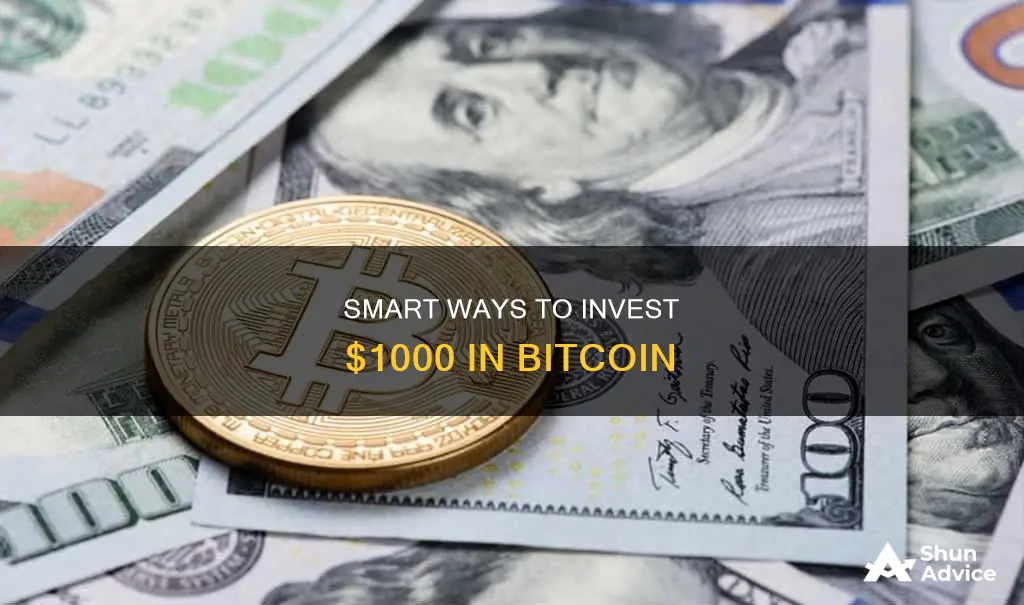
Bitcoin is a highly volatile investment option that has seen several peaks and troughs since its launch in 2009. Despite its volatility, Bitcoin has been making waves as the hottest investment on the planet, with many investors doubling their returns in a few months. With just $1000, you can enter the world of crypto and invest in Bitcoin, but it's important to remember that it's a risky venture. Billionaire entrepreneur Mark Cuban and Oracle of Omaha Warren Buffett have warned against Bitcoin's unstable value, and legendary investor Jack Bogle advised avoiding it altogether. However, with a small investment, you can learn about this digital currency and track its performance without taking on too much risk.
| Characteristics | Values |
|---|---|
| Volatility | High |
| Market cap | $736 billion |
| Value in April 2021 | $63,000 |
| Value in July 2021 | $38,750 |
| Value in December 2017 | $20,000 |
| Value in July 2016 | $656.17 |
| Value in July 2011 | $13.91 |
| Value in December 2013 | $1,000 |
| Value in October 2018 | $6,400 |
What You'll Learn

Bitcoin's value and volatility
Bitcoins Value and Volatility
Bitcoin's value has grown from less than $1 to thousands of dollars since its launch in January 2009. In December 2017, the value of Bitcoin hit an all-time high of nearly $20,000. However, its value is volatile and subject to significant fluctuations. For example, less than a year after reaching its peak, Bitcoin's value dropped to about $6,400.
Bitcoin's volatility is influenced by several factors, including supply and demand, investor and user sentiments, government regulations, and media hype. As a relatively new asset class, Bitcoin is still in the price discovery phase, and its value is yet to stabilise. The limited supply of Bitcoin, with a maximum threshold of 21 million, and the lack of a central bank to control that supply, also contribute to its volatile nature.
The varying belief in Bitcoin's utility as a store of value and a method of value transfer also influences its volatility. Some investors view Bitcoin as a hedge against inflation and an alternative to traditional stores of value, such as gold. However, others, like billionaire entrepreneur Mark Cuban and "Oracle of Omaha" Warren Buffett, have warned against investing in Bitcoin due to its unstable value.
The actions of "Bitcoin whales", or investors with large holdings, can also impact the market value of Bitcoin. If these whales were to suddenly liquidate their holdings, it could cause a panic among other investors, leading to a rapid decline in prices.
Media outlets, influencers, industry moguls, and cryptocurrency fans can also create investor concerns, leading to price fluctuations. For example, when media outlets announced the introduction of a Bitcoin Strategy ETF in October 2021, Bitcoin's price skyrocketed. However, when investors realised the ETF was linked to Bitcoin through futures contracts, prices dropped back down.
Government regulations and agency views can also affect Bitcoin's price. For instance, China's government and central bank announced in 2021 that all cryptocurrency transactions were illegal, leading to a drop in Bitcoin's price. On the other hand, the approval of bitcoin-related securities by the Securities and Exchange Commission in the U.S. in 2024 drove Bitcoin's price up from about $27,000 to more than $43,000.
Overall, Bitcoin's value and volatility are influenced by a complex interplay of factors, including supply and demand, investor sentiment, media hype, and government regulations. As a relatively new asset class, Bitcoin's price is still discovering its stable point, and its volatility is likely to continue until then.
Doge Coin Stock Investment: A Beginner's Guide
You may want to see also

How to invest $1000 in Bitcoin
Bitcoin is a decentralised currency that has been around since 2009. It has experienced recent all-time highs, which has helped many investors double their returns in only a few months.
If you are looking to invest $1000 in Bitcoin, there are a few things to consider.
Firstly, it is important to understand the risks involved. Bitcoin is a very volatile asset, and its value can fluctuate greatly. While it has seen huge growth over the years, it has also experienced significant plunges. As a result, it is generally recommended that you only invest what you can afford to lose.
One way to mitigate the risk is to spread your investment across several different cryptocurrencies, rather than putting all your money into Bitcoin. This ensures that if one coin performs poorly, you don't lose your entire investment.
When you are ready to purchase Bitcoin, you can do so through major cryptocurrency exchanges or brokerage firms. Popular exchanges include Coinbase and Robinhood. You can also use other exchanges such as OKEx, which offers high liquidity and numerous payment options.
It is also a good idea to start with fractional shares, especially if you are intimidated by the high price of Bitcoin. For example, if the price of Bitcoin is $50,000, you can use your $1000 to buy 0.02 Bitcoin. As the price of Bitcoin increases, the value of your proportional share will also increase.
Finally, remember that past performance is not a guarantee of future returns. Do your own research, and only invest what you are comfortable with.
The Ultimate Guide to Investing in Bitcoin
You may want to see also

Other cryptocurrencies to invest in
Cryptocurrencies are incredibly volatile and not for all investors. Decide if they fit your risk tolerance before diving in. If you plan to invest in the crypto world, spread your investment across several coins. This ensures that if things don't turn out as expected with one coin, you don't lose your entire investment.
Ethereum (ETH)
Ethereum is a decentralised software platform that enables the creation of smart contracts and decentralised applications (dApps) without any downtime, fraud, control, or interference from a third party. The goal behind Ethereum is to create a decentralised suite of financial products that anyone in the world can freely access, regardless of nationality, ethnicity, or faith. This aspect makes the implications for people in some countries more compelling because those without state infrastructure and state identifications can get access to bank accounts, loans, insurance, or a variety of other financial products.
Ethereum is the second-largest cryptocurrency by market capitalisation after Bitcoin, with a market cap of about $199 billion as of August 25, 2023. Ether, its platform-specific cryptographic token, is used to pay validators who stake their coins for their work on the blockchain, as a payment method off-chain, and as an investment by speculators.
Tether (USDT)
Tether was one of the first and most popular stablecoins, which are cryptocurrencies that aim to peg their market value to a currency or other external reference point to reduce volatility. Tether's price is tied directly to the US dollar because the developers claim to hold one US dollar for every circulating USDT. This system allows users to make transfers from other cryptocurrencies back to US dollars more easily and quickly than actually converting to standard currency.
As of July 22, 2023, Tether was the third-largest cryptocurrency by market capitalisation, with a market cap of $83.8 billion and a per-token value of $1.00.
Binance Coin (BNB)
Binance Coin is a utility cryptocurrency that operates as a payment method for the fees associated with trading on the Binance Exchange, one of the most widely used exchanges in the world. Those who use the token as a means of payment for the exchange can trade at a discount.
Binance Coin's blockchain is also the platform on which Binance's decentralised exchange operates. Binance Coin was initially an ERC-20 token on the Ethereum blockchain but has since launched its mainnet and uses a proof-of-stake consensus model. As of July 22, 2023, Binance Coin had a market capitalisation of $37.3 billion, with one BNB valued at around $242.55.
Solana (SOL)
Like Ethereum, Solana is a blockchain that was built with utility in mind, particularly for facilitating the easy creation of decentralised applications. The Solana blockchain is even faster than Ethereum, has far lower fees, and is intended to be more easily scalable than its rivals.
SOL, the native token of the Solana blockchain, started trading in 2020 and has had a meteoric rise since then. As of June 3, 2024, SOL accounted for 2.98% of the crypto market's total value, representing a nearly 300-fold increase in its market share. Excluding stablecoins, Solana is the fourth-largest cryptocurrency in the world, with a market capitalisation of around $76 billion.
Cardano (ADA)
Cardano is a proof-of-stake blockchain and one of the largest blockchains to successfully run that more energy-efficient protocol. Cardano aims to foster a developer-friendly ecosystem for decentralised applications. Unlike Ethereum, Cardano has a hard cap on the number of coins that can ever exist, topping out at 45 billion.
As of July 22, 2023, Cardano had the seventh-largest market capitalisation at $10.9 billion, and one ADA traded for around $0.31. Cardano shed 81% in 2022 but has managed to nearly double since the beginning of 2023. ADA now trades for roughly 46 cents and boasts a market cap of more than $16 billion.
Polygon (MATIC)
Polygon, formerly known as Matic, was initially developed as a layer-2 solution to address the issues with Ethereum network congestion and traffic. Recent innovations have allowed it to become a multi-chain system where blockchains can work together using Ethereum's virtual machine.
Polygon uses three layers: Ethereum, Heimdall, and Bor. The Bor layer is a block-producing layer that compiles transactions into blocks and creates periodic snapshots of the blockchain. The validators on this layer are called block producers, and their blocks are aggregated by the Heimdall layer, which validates all the blocks created since the last snapshot.
As of July 22, 2023, MATIC traded at $0.76 and had a market cap of $7.09 billion.
Why You Should Consider Investing in Bitcoin Investment Trust
You may want to see also

Risks of investing in Bitcoin
Yes, you can invest $1000 in Bitcoin. Here is a simple guide on how to do it:
- Spread your investment into several coins.
- Ensure that the $1000 only represents a small portion of your net worth.
- Only invest what you can afford to lose if you are new to the crypto sector.
- Invest some in Bitcoin and some in Ethereum.
- You could also invest in DeFi platform coins.
However, there are some serious risks when it comes to investing in Bitcoin. Here are some of the risks of investing in Bitcoin:
Volatile and Fluctuating Market
The price of bitcoin is constantly changing. There is no telling if you will get a return on your investment. To avoid a massive loss, keep a vigilant eye on the market. Make small investments; they will be more beneficial in the long term.
Cyberattacks and Fraud
Bitcoin is technology-based, which leaves this investment open to cyberattacks. Hacking is a serious risk since there is no way to retrieve your lost or stolen bitcoins. There is also a fair amount of fraud in the bitcoin market, and a lack of security creates a big risk for investors.
Little or No Regulation
Currently, the bitcoin market is operating without any major regulations. The government doesn't have a clear stance on cryptocurrency; the market is just too new. It is not taxed, which can make it enticing as an investment opportunity. However, a lack of taxation could lead to problems for bitcoin if it poses competition for government currency.
Technology Reliance
Bitcoin is an online exchange that is reliant on technology. Without that technology, cryptocurrency is worth nothing. With a currency that is 100% technology-based, bitcoin owners are more vulnerable to cyber threats and online fraud.
Block Withholding
New bitcoins are created by solving mathematical equations called "blocks". A mining pool can use computational power to mine a block and hide it from honest miners, essentially allowing a select few to reap the benefits while others are left with nothing.
Get Bitcoin for Free: No Investment Needed
You may want to see also

Bitcoin's blockchain technology
Bitcoins Blockchain Technology
Bitcoin is the most well-known example of a cryptocurrency, which is a medium of exchange that uses cryptographic techniques to verify the transfer of funds and control the creation of monetary units. Blockchain is the technology that enables the existence of cryptocurrency.
A blockchain is a decentralized, immutable, and distributed ledger that consists of blocks containing transactional records, or metadata, that are stored in a chain of blocks. Each block contains a unique cryptographic value, or hash, that is used for verification purposes. The blocks are linked together using cryptographic techniques and form a chronological chain of information.
The Bitcoin blockchain collects transaction information and enters it into a 4MB file called a block. Once it is full, certain information is run through an encryption algorithm, which creates a hexadecimal number called the block header hash. The hash is then entered into the following block header and encrypted with the other information in that block's header, creating a chain of blocks.
The Bitcoin protocol is built on a blockchain. In a research paper introducing Bitcoin, its pseudonymous creator, Satoshi Nakamoto, referred to it as “a new electronic cash system that’s fully peer-to-peer, with no trusted third party.”
Blockchain technology achieves security and trust in several ways. New blocks are always stored linearly and chronologically, and previous blocks cannot be changed without altering the hash of the subsequent block. Because each block contains the previous block's hash, a change in one would change the following blocks. The network would generally reject an altered block because the hashes would not match.
The Bitcoin blockchain is decentralized, meaning no single person or group has control—instead, all users collectively retain control. This decentralized nature helps to promote transparency, trust, and security. It also reduces the risk of relying on a single point of failure and minimizes the risks of data manipulation.
Smart Bitcoin Stock Investment Strategies for Beginners
You may want to see also
Frequently asked questions
Bitcoin is a very volatile asset, so investing in it carries a high risk. However, the rewards can be great. If you do decide to invest in Bitcoin, it is recommended to spread your investment into several coins to reduce the risk of losing your entire investment.
You can purchase fractional shares through major cryptocurrency exchanges or brokerage firms. Popular exchanges include Coinbase and Robinhood.
Billionaire entrepreneur Mark Cuban and investor Warren Buffett have both warned that Bitcoin's value is unstable. Jack Bogle, the founder of Vanguard, went as far as to say, "Avoid bitcoin like the plague." Bitcoin is also known for its volatility, with no central authority to intervene in the market.
Bitcoin is the hottest investment on the planet right now, and it has been making a lot of noise in the markets. As the first decentralised currency, it has the potential to revolutionise financial services. Investing a small amount in Bitcoin can be a great learning opportunity, allowing you to track it, read about it, and understand the technology behind it.
Instead of investing in Bitcoin, you could consider investing in other cryptocurrencies such as Ethereum, DeFi platform coins, or Dogecoin. Alternatively, you could invest in more traditional assets such as the S&P 500, which is considered a relatively reliable investment.







